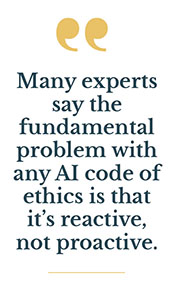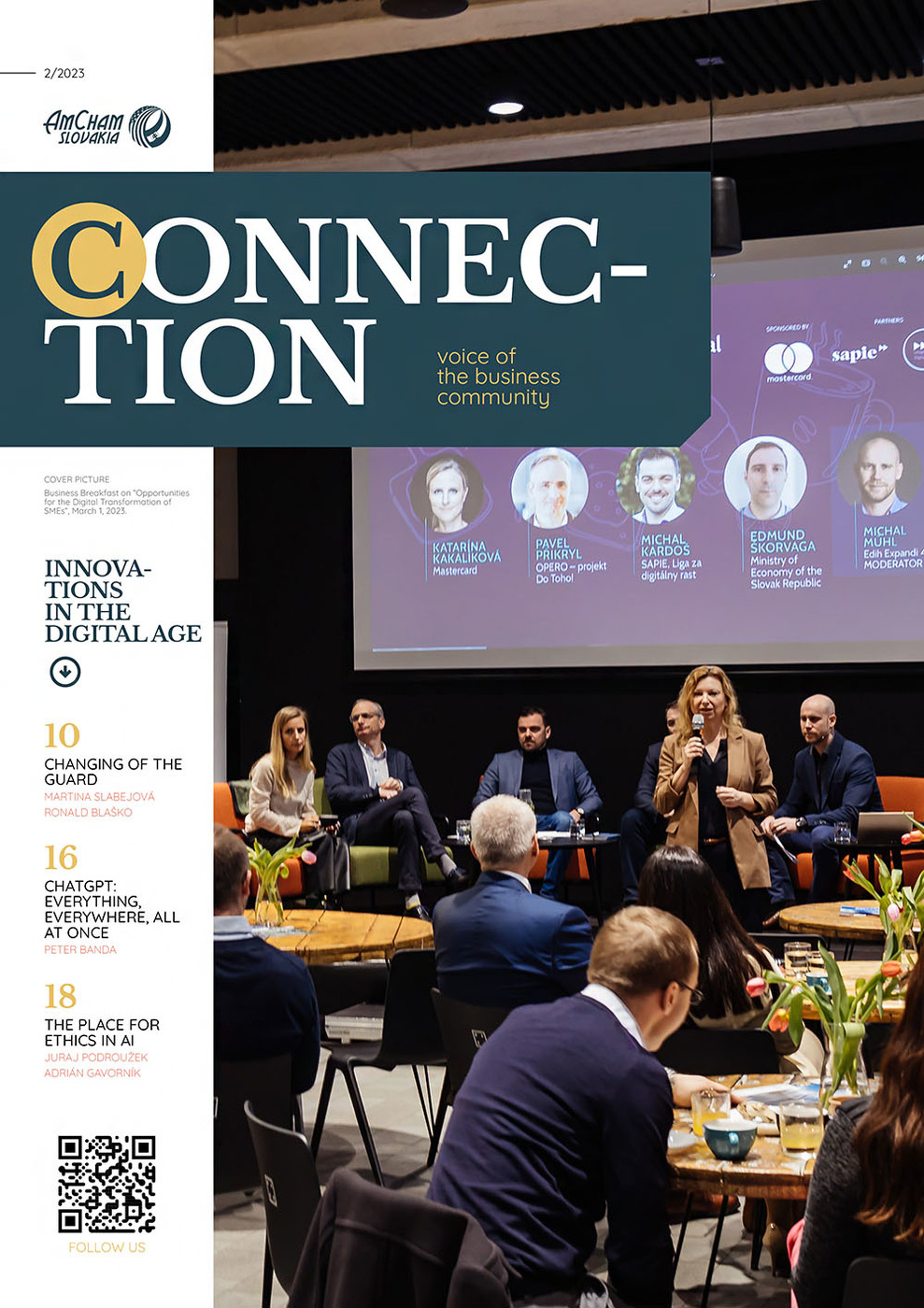We are in 2023 and on a global scale, artificial intelligence (AI) is not subject to a single set of laws. And although the industry recognizes the necessity of ethical standards, currently there are no universally applicable AI ethics rules.
The history of AI can be tracked back to ancient civilizations. However, the modern field of AI as we know it today began to take shape in the 1950s. Already back then Alan Turing introduced a test (now known as the Turing Test) to determine if a machine could exhibit intelligent behavior that is indistinguishable from that of a human.
Especially in the 1980s and 1990s when AI research focused on developing specific capabilities the field of AI began to shift from rule-based systems towards the use of machine learning, which involves training a system using a large dataset and allowing it to learn from the data. In recent years there has been an enormous interest in AI, driven by the availability of large amounts of data, the development of more powerful computing hardware and the advancement of machine learning techniques such as deep learning. This has led to the development of AI systems that can perform tasks that were previously thought to be the exclusive domain of humans.
AI is being applied in many different sectors, some of the most notable include healthcare (analyzing medical images, identifying patients at risk of certain condition, assisting with diagnoses), finance (fraud detection, risk management, investment analysis), retail (personalizing of customer experiences, optimizing pricing and inventory management, automating customer service), transportation (self-driving cars, traffic prediction and management, optimizing logistics and supply chain management), manufacturing (predictive maintenance, process optimization, quality control), agriculture (precision farming, crop monitoring, yield prediction), education (personalized learning, assessment and automated grading), energy (optimizing energy consumption and distribution, forecasting energy demand and improving the efficiency of renewable energy sources), security (face and object recognition, event prediction and management, threat detection) and marketing (targeted advertising, customer segmentation, chatbots for customer service).
Why is AI value platform so crucial?
AI can generate many actions which are contrary to widely accepted ethics rules. You might remember cases where AI has been involved in unexpected situations, such as when Tay, an AI-powered chatbot released in 2016 by Microsoft on Twitter, was able to generate offensive and controversial tweets within 24 hours of being online, including statements that were racist and sexist. Or in 2017, when Google’s image recognition AI system labeled a photo of a couple as gorillas due to the couple’s dark skin color, which led to widespread criticism.
Many of us are familiar with films like The Terminator, Blade Runner, Ex Machina, The Matrix, AI, Transcendence, Her, or Wall-E that include AI as a central topic or that examine AI-related ethical concerns.
 Furthermore, many experts say the fundamental problem with any AI code of ethics is that it’s reactive, not proactive.
Furthermore, many experts say the fundamental problem with any AI code of ethics is that it’s reactive, not proactive.
The future of AI is very promising, the range of AI applications in practical life is growing every day and it is it obvious that it comes with many ethical concerns that need to be addressed.
Regulation
Many countries have laws and rules in place that cover particular applications of AI, like data security and autonomous vehicles. The General Data Protection Regulation (GDPR) of the EU is applicable to AI systems that handle personal data, ensuring that individuals have the right to access and manage their personal data and that corporations are responsible for how they use AI, and AI systems are transparent in how they make judgments. There are still no federal laws in the US that directly control AI, although there are laws and rules that apply to particular uses of AI, such as HIPAA, which controls its use in healthcare, and FAA, which controls its use in drones.
Following calls for international collaboration in AI regulating we encountered various guidelines and principles that have been proposed by organizations such as the IEEE, the EU and the Partnership on AI. AI experts and scholars created the so called 23 Asilomar AI Principles. In 2021 the 193 Member States at UNESCO’s General Conference adopted the Recommendation on the Ethics of Artificial Intelligence, the very first global standard-setting instrument on the subject. One of the biggest legislative endeavors is now being produced in the EU: the AI Act.
All the existing guidelines focus on issues such as
- data privacy: ensuring that personal data used to train and operate AI systems is collected, stored, and used in a way that respects individual rights and complies with relevant laws and regulations;
- explainability and interpretability: making sure that AI systems can be understood and their decisions can be explained, so that users and stakeholders can assess their trustworthiness and potential biases;
- fairness and bias: ensuring that AI systems do not discriminate against certain groups of people and that their decisions are based on valid and unbiased input data;
- safety and security: minimizing the risk of unintended harm or damage from the use of AI and protecting AI systems from malicious attacks;
- human oversight and control: providing mechanisms for human oversight and control over AI systems and ensuring that AI systems do not replace or undermine human decision making.
We all know that following good AI ethics is not just responsible behavior, it is required to get good business value out of AI. Ethics issues can pose business risk such as product failures, legal issues, brand damage and more. Along with multiple advantages, these technologies also generate downside risks and challenges, derived from malicious use of technology or deepening inequalities and divides. As Elon Musk stated “AI is a fundamental risk to the existence of human civilization”, the society must therefore be prepared for unethical use of AI.
Katarína Pecnová, Managing Counsel, Dentons



Follow us